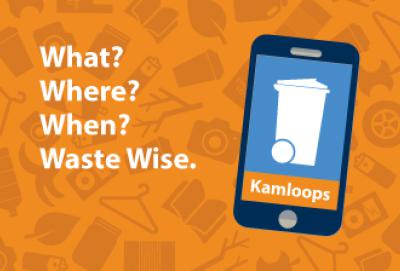Care About Bears

People and wildlife, such as bears, are increasingly sharing space throughout Kamloops, so we must learn how to live harmoniously with them. Bears enter neighbourhoods primarily in search of food. Proper management of all potential sources of food, including solid waste carts, goes a long way to reduce human-bear conflict.
It’s normal for a bear to travel though our community in certain instances, such as accessing natural food sources or relocating to areas once included in their natural home range. However, when bears begin to utilize human-provided food sources in a community, it creates the potential for human-bear conflict.
Addressing the source of human-bear conflict reduces the risk to human safety and private property and the number of bears destroyed. Wildlife see improperly managed and unsecured garbage and organic waste as an easy food source.
Removing access to these attractants is key to preventing food conditioning, which is a learned behaviour where wildlife associate people and their property as an easily accessible food source.
Bears that are conditioned to non-natural food sources are not candidates for relocation or rehabilitation because of the high risk to public safety, as they typically show minimal fear of people. Remember, a fed bear is a dead bear.
Bear Smart Tips
Unmanaged bear attractants around our homes can unintentionally attract bears to our neighbourhoods as they sniff out food sources. A bear can pick up a scent from kilometers away!
Kamloops is a Bear Smart Community
Did you know? Kamloops is one of only 10 BC communities that has achieved official Bear Smart status. Being a designated Bear Smart Community means we work to address the root causes of human-bear conflict and help keep our community and local bear population safe.
Please Report All Sightings
Report all sightings and human-wildlife interactions to the BC Conservation Officer Service by calling 1-877-952-7277.
How to respond if you encounter a bear
We work in partnership with WildsafeBC on preventing conflict with wildlife. For more information and resources to help avoid conflict with wildlife, contact the Kamloops WildSafeBC Coordinator at 250-828-2551 or visit WildSafeBC.
e City is beginning the process of reducing the number of public garbage containers in park spaces and replacing the remaining containers with bear-proof versions.
This initiative is an effort to minimize bear attractants in public spaces. Effectively managing bear attractants supports the City’s commitment as a designated Bear Smart Community to help keep the community and bear populations safe.
City crews will begin by removing unnecessary or repetitive garbage containers while implementing a longer-term plan to replace the remaining containers with bear-proof ones, beginning in high bear hazard areas.
In the absence of a garbage container at a previously known location, the City encourages park users to locate a nearby receptacle that will be a short distance away.






